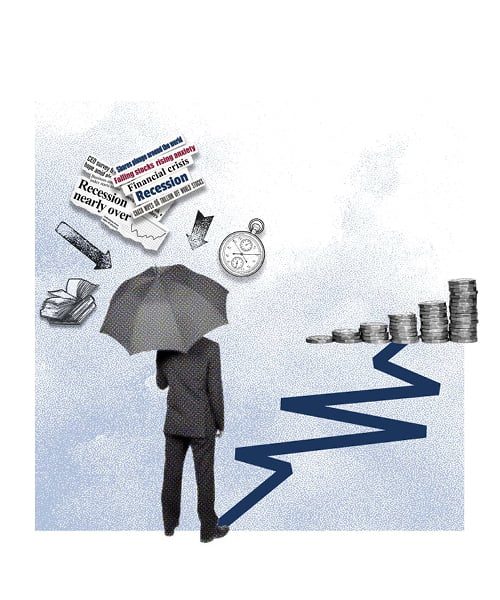Uncovering behavioural biases when investing

What you need to know
- Behavioural biases are a natural part of human decision-making, but they can cause people to make irrational choices
- Herd mentality, confirmation bias, the availability bias, loss aversion and the endowment effect are just some of the cognitive biases that investors face
- News headlines that trigger an emotional response can exacerbate our behavioural biases, which is why investors should consume the news with care
- With the right investment approach and philosophy, it's possible to identify behavioural biases and reduce their impact when investing
Most of us like to think we’re rational decision-makers. We tend to believe that our choices are based on logic and reason, rather than driven by emotion.
In reality, all of us are biased. Our brain makes shortcuts to deal with a very complex world and that simplified mental model is not always a good reflection of reality. Try as we might, it's difficult to prevent our personal beliefs, past experiences and gut feelings from affecting the choices we make. That includes how we make investment decisions.
But while it’s difficult to identify our own biases, it’s not impossible.
With the right approach, investors can counteract the behavioural biases that could otherwise lead them astray. But first, let's talk about why we have these biases.
Overcoming our instincts
From an evolutionary perspective, behavioural biases are a feature of our decision-making process, not a bug. Our brains are designed to react instantly to danger, and this ability to quickly gauge risk helped our ancestors avoid becoming a predator's lunch.
So, when faced with an immediate threat, we tend to rely on our instincts and intuition rather than logic. These mental shortcuts are vital in a life-or-death situation, but they can cause kneejerk reactions at times when a cooler head would prevail.
Investing is one of those times. When our wealth is at risk, market volatility can feel as threatening to us as a rustling in the bushes did to our ancestors.
But unlike our forebears, we don't need to be quite as hasty in our decision-making. By being aware of what behavioural biases may negatively impact our choices, we can seek to overcome them.
Cognitive biases in investing
There are hundreds of behavioural biases, so this is by no means an exhaustive list, but here are some of the more common issues that investors face.1
Herd mentality
People have a tendency to be overly influenced by the actions of others, especially when emotions are running high. There is safety in numbers, so following the herd gives us a sense of security in uncertain situations. Unfortunately, a herd mentality can be counterproductive when investing.
A sudden slump in financial markets can induce panic selling, crystallising losses in otherwise sound investments.
Market booms are just as risky as investors are encouraged to buy certain assets when their price skyrockets – leading to a bubble that will usually burst once overvalued investments revert to the mean.
Investor Warren Buffett has a simple approach to help him avoid following the crowd, summed up by his quote that investors should “be fearful when others are greedy and greedy when others are fearful”.2
Availability bias
Are you more anxious about air travel when you have recently heard about a plane crash? Would you be reluctant to swim in the sea after watching a shark documentary?
If so, you have experienced availability bias, which is when we place more importance on examples that we can immediately retrieve from our memory. This is often a cognitive error because events are usually memorable precisely because they are rare or extraordinary, not because they are accurate or representative.
Confirmation bias
We all like to be proven right. So much so, that we’ll often seek out information that affirms our beliefs and preconceptions, while ignoring or downplaying evidence to the contrary.
This is confirmation bias, and investors are just as susceptible as anyone else. For example, you may subconsciously cherry-pick favourable analysis when researching an interesting investment rather than evaluating all the available information, good or bad.
Endowment effect
Otherwise known as ownership bias, the endowment effect is when people place greater value on objects they own.
A well-known experiment illustrated this behaviour by asking participants to hypothetically buy and sell college basketball season tickets. The researchers found that sellers expected to receive as much as 14 times the price for the tickets than they themselves would pay for them when buying.3
The endowment effect is most evident among investors when they hold on to particular assets for too long, often due to an emotional attachment or loss aversion.
Loss aversion
A loss has a bigger effect on us psychologically than a gain. The exact figure differs from study to study, but it is thought to be around twice as much. In other words, losing £100 on a coin flip has the same emotional impact as winning £200.
As such, many people look to avoid losses as much as possible. Risk aversion isn't inherently negative, but as mentioned above, it can cause investors to hold on to bad investments or look for reasons not to sell – our old enemy confirmation bias rearing its head once again.
People have a tendency to be overly influenced by the actions of others, especially when emotions are running high."
Consuming the news
Many behavioural biases are heavily influenced by what we hear in the news, and this can have a knock-on effect on investment decisions.
Availability bias means we place increased emphasis on easily recalled examples, and herd mentality means we’re more inclined to believe something if many people are saying it.
In recent years there has been an significant amount of negative news headlines about the UK economy. This has an influence on sentiment. Yet the UK is one of the cheapest developed stock markets in the world based on price-to-earnings multiples.
This is fed by availability bias and herd mentality.
This is just one example. Media coverage and market noise can affect investors' decisions in many ways, and there's no shortage of outlets serving up news catered to our specific tastes, feeding confirmation bias.
Ultimately, it's important to recognise that what's in the news doesn't always reflect reality. That's why we believe investment decisions should be made deliberately and with a high level of conviction, after deep research and independent analysis.
Cutting through the noise
No one is immune to behavioural biases. After all, they are hardwired into our DNA.
What we can do as investors is to be aware of these biases and the impact they have on our decision-making.
At Rothschild & Co, our investment approach and processes are designed to counteract behavioural biases and cut through market noise.
The companies and funds we invest in are examined from all angles until we’re confident that we’re making the right choice for our clients' wealth. Truly focusing on the long term is a key component to avoid bias. Having a clear investment objective to preserve wealth in real terms is another one.
If you would like to know more about how we overcome behavioural biases when investing, please get in touch.
Our investment approach and processes are designed to counteract behavioural biases and cut through market noise."
Ready to begin your journey with us?
Citations
1 For more information on cognitive biases in investing, please read our Quarterly Letters - 'Fighting against our instincts' and 'Straying from the herd'
2 Buy American. I Am, Warren Buffett, The New York Times, 17 October 2008
3 Predictably Irrational: The Hidden Forces that Shape our Decisions, Dan Ariely, 2008
Past performance is not a guide to future performance and nothing in this article constitutes advice. Although the information and data herein are obtained from sources believed to be reliable, no representation or warranty, expressed or implied, is or will be made and, save in the case of fraud, no responsibility or liability is or will be accepted by Rothschild & Co Wealth Management UK Limited as to or in relation to the fairness, accuracy or completeness of this document or the information forming the basis of this document or for any reliance placed on this document by any person whatsoever. In particular, no representation or warranty is given as to the achievement or reasonableness of any future projections, targets, estimates or forecasts contained in this document. Furthermore, all opinions and data used in this document are subject to change without prior notice.





